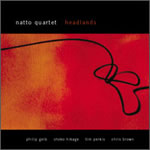|
|
 |
Dusted Reviews
Artist: Natto Quartet Album: Headlands Label: 482 Music Review date: Jun. 2, 2003 |

|
|
|
 |
Improv Featuring Shakuhachi And Koto
There aren’t many improvising shakuhachi players in the U.S., which is too bad, because the shakuhachi and the new improv seem tailor-made for one another. The shakuhachi, a Japanese bamboo flute, offers relatively easy access to microtones, which are the notes between the notes that improvisers like Mat Maneri and Joe Giardullo now focus upon. Also, performers schooled in the traditional honkyoku style of shakuhachi playing should feel right at home with the loose rhythms of free improv.
San Francisco-based musician Philip Gelb is one of the few shakuhachi-playing improvisers out there, and his music demonstrates that the shakuhachi has a place in improvised music. He’s joined in the Natto Quartet by koto player Shoko Hikage, pianist Chris Brown and electronics player Tim Perkis. The group’s unusual lineup will probably inspire lame “East meets West”-style descriptions, which aren’t fair because “Eastern” and “Western” are not mutually exclusive descriptors, especially not in San Francisco. Besides, the Natto Quartet’s music sounds natural enough that no one’s really meeting anyone else: there are no awkward handshakes and no idle chitchat.
Headlands, the Natto Quartet’s new well-produced live recording, is moody and smoothly crafted; it achieves drama through subtlety, not surprise. The members of the group strive to blend as an ensemble, emphasizing texture instead of charging off in different directions. Their concentration on texture suits the breathy-sounding shakuhachi well, and Gelb is in fine form here, coating much of the album with gauzy, blurred lines that give it a dreamlike feel. Perkis plays a complementary role, offering sustained sounds that keep Gelb from contrasting too much with the rest of the ensemble. Brown sometimes supports the koto’s percussive runs with tangled, percussive bursts of his own, but just as often he plays with his sustain pedal down, contributing to Perkis and Gelb’s atmospheric textures.
The Natto Quartet’s emphasis on texture and apparent disinterest in soloistic playing make the group more similar to AMM than to most American free jazz. But the Natto Quartet doesn’t sound much like any other group I’m aware of, if only because there aren’t many koto or shakuhachi players in free improv. Both the shakuhachi and the koto facilitate the use of microtones better than their closest “Western” analogues (the flute and the guitar, respectively). Gelb and Hikage take full advantage of that fact on Headlands, in which their frequent pitch slides contribute to the hazy feel of the album.
By Charlie Wilmoth
|







